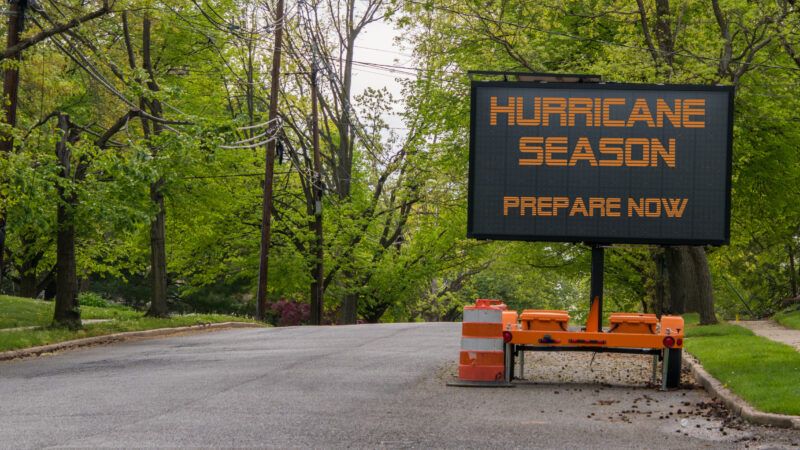FEMA Is a Disaster. Trump Is Right To Demand Changes.
The agency is ineffective, duplicative, and expensive.

During a recent visit to Asheville, North Carolina, President Donald Trump floated the idea of fundamentally overhauling the Federal Emergency Management Agency (FEMA). "If it was up to me," Trump said, "I'd end [FEMA] right now, and I'd just let the state take care of the problem." He subsequently signed an executive order to assess FEMA's ability to provide "immediate, effective, and impartial response to and recovery from disasters."
The president's comments brought immediate pushback. Kentucky Democratic Gov. Andy Beshear called the elimination of FEMA a "very bad idea." Sen. Bill Cassidy (R–La.) stopped short of condemning Trump's comments, saying some federal disaster agency is needed, even if that agency isn't FEMA.
But Trump is right about this one. The system of federal disaster relief does need reform. FEMA's failures are well-documented, and they have come at a steep cost to taxpayers. Though the agency has received nearly $30 billion in annual appropriations the past three years, areas impacted by natural disasters have seen suboptimal recovery, including Hawaii, Puerto Rico, Florida, and North Carolina.
The lack of response from FEMA is particularly evident in western North Carolina, which was hit hard by Hurricane Helene's flood waters in September. Residents of the area are sleeping in campers, many of which were donated by local and national charities, as they wait through the winter unsure when funding will come through to rebuild their homes. But the problem isn't insufficient spending. The federal disaster relief fund, the majority of which is spent by FEMA, is comprised of both annual and supplemental appropriations following disasters. Since 2020, actual spending from this fund has averaged four times higher than the average spent throughout the 1990s. Even with this increase, FEMA has failed to produce swifter, more effective aid.
Rather, FEMA's failures stem from a bloated bureaucracy and perverse incentives. Because the agency is guaranteed to pick up the check in an emergency no matter its size, states have less incentive to prepare for natural disasters. However, the American disaster response system is intended to rely on federalism and private charitable efforts. "Unfortunately, growing federal intervention is undermining this efficient, decentralized structure," writes Chris Edwards, an economist at the Cato Institute.
In the two decades since the agency's infamous Hurricane Katrina blunders, FEMA has failed to upend its deplorable reputation. Months after Hurricane Helene, FEMA had delivered only 46 temporary homes to North Carolina for the more than 500 families approved for a trailer. North Carolinians in Avery County remain baffled at the 80 trailers that remain vacant at a nearby FEMA staging area even today. In a response to the unused trailers, an agency spokesperson blamed weather and permitting requirements for the delay. But charities such as Samaritan's Purse and Cajun Navy have already overcome these hurdles to deliver temporary housing without the backing of federal funding. Perhaps organizations with better track records of resource stewardship might be better recipients of critical disaster response funding.
Any substantive changes to the agency would have to be approved by Congress. Hopefully, the assessment required by the recent executive order will help politicians find the will to reform the agency or abolish it outright.


Show Comments (31)